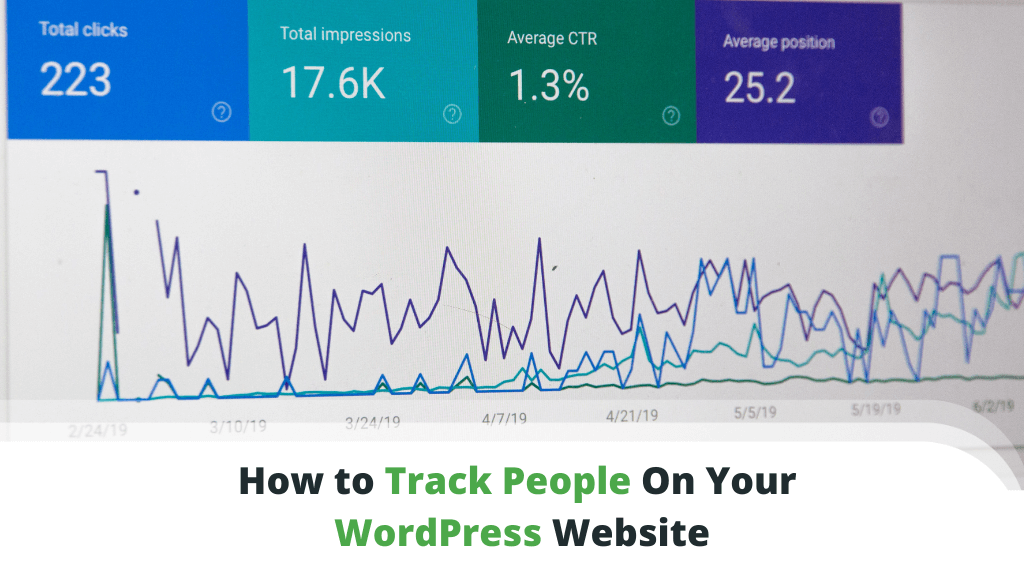
Knowing how to track people on your WordPress website is vital in the quest of increasing web traffic. By working with the data you gather, you can build more accurate content, streamline traffic flow, and much more. Today we’re going to dive into greater detail on the benefits of audience tracking.
Table of contents:
- Why Track Your Website Visitors?
- How to Track Visitors On Your WordPress Website?
- Setting up Google Analytics
- Utilizing a Visitor Tracking WordPress Plugin
- Viewing Tracking Reports in Google Analytics
- ScalaHosting and WordPress
- Conclusion
- Frequently Asked Questions
Why Track Your Website Visitors?
The average website owner typically keeps an eye on at least one metric – how many visitors are coming to the site. After all, it is an excellent indicator of your WordPress site performance.
Yet, not all traffic is equal. For instance, how do you know if that traffic is heading to your key target pages or your sales pages are reaching their goals?
Tracking your website visitors can offer priceless insights you can leverage to improve the effectiveness of your business.
Information you can get from visitor tracking includes:
- Sources – where your visitors are coming from
- Destinations – which pages they are heading to
- Keywords – what they’re looking for
With information like this, you can decide what areas may need improving to maximize your website efficiency.
How to Track Visitors On Your WordPress Website?
The most common tool that website owners utilize is Google Analytics. The solution offers exceptionally comprehensive visitor data and only requires you to add some tracking code to your WordPress site.
Since many people use Google products, it also ties in data from other Google platforms like Adsense and Google Search. If working with code isn’t your thing, don’t worry – there are options available as well.
First, let’s look at Google Analytics more closely.
Setting up Google Analytics
When it comes to WordPress websites, there are two main ways of working with Google Analytics. You can either add the code generated by Google right onto your site’s pages or make use of a WordPress plugin.
Before going for either of those, you need to sign up for a Google Analytics account. The process is similar to registering for any free web service. If you’re already a Google product user, you can use your existing Google ID to sign in.
Next:
- Sign up for Google Analytics
- Select Website as the item you want to track
- Fill in details as requested
Once you’ve done that, just click the Get Tracking ID button, and the system will generate the code you need to use. It will also tell you where exactly you need to insert that piece of code on your website.
Utilizing a Visitor Tracking WordPress Plugin
One of the main reasons so many webmasters turn to WordPress is because of how much it simplifies website building. Its zero-coding utility extends to visitor tracking as well. Because of this, you don’t have to insert code manually if you don’t wish to – just use a tracking plugin for the job.
There are many high-quality WordPress add-ons available for Google Analytics. Not only do they simplify the user experience, but they also offer closer integration with your WP pages.
Three of the best-known plugins in this niche are:
- MonsterInsights
- Analytify
- ExactMetrics
We’ve recently done a roundup of the best Google Analytics plugins for WordPress, and these three have come out on top in many of the reviewed areas.
MonsterInsights
This industry-leading plugin is one of the most popular around when it comes to Google Analytics. It is easy to set up and gets you plenty of useful reports and insights on your site traffic and audience.
Top features of MonsterInsights include:
- Real-time statistics tracking
- Tracking custom WordPress elements
- Affiliate link tracking
The only downside is the various limitations applied to the free version. If you intend to use MonsterInsights to its fullest – the Pro version starts at $99.50/mo.
Analytify
Analytify is another useful Google Analytics plugin that brings everything to your WordPress dashboard. Quick stats access and real-time data are among its most notable advantages. You can even get insights not available in Google Analytics, such as individual page traffic breakdowns.
Top features of Analytify include:
- Campaign tracking with URL builder
- Social media statistics
- Support for WooCommerce
- Simplified chart presentations
The free version of Analytify is useful, but you’ll gain maximum benefits with a paid subscription. That starts at $39/mo – way more affordable than MonsterInsights.
ExactMetrics
ExactMetrics claims to offer some of the most accurate stats tracking data in the market. Its ecommerce support is a prime reason for its popularity, but there seems to be a lot more to it.
Top features of ExactMetrics include:
- Page-level insights
- Custom dimensions
- GDPR/CCPA compliance
- Ecommerce tracking
While there isn’t technically a free version of this plugin, you can get what they call an “unlimited trial.” Use that plan for as long as you like, then hop onto a subscription plan if you need more power.
Sure sounds like a bargain.
Viewing Tracking Reports in Google Analytics
If you decide to stick with good ol’ Google, you’ll need to familiarize yourself with the GA dashboard. Although you’ll need to head outside of your WordPress dashboard to do so, the Google Analytics site is honestly very comprehensive.
Make sure to check:
Overview Reports
As the name implies, this is a quick snapshot tool that shows you a few general information categories. These areas cover things like real-time visits, basic demographics, and even visitor devices.
Note there are various overview reports available in multiple sections. These all serve the same function – to give you a quick view of essential site metrics you can use to your advantage.
How can this help: Depending on the report you’re looking at, you can consider varying actions. For example, the Device Breakdown lets you know if you need to enhance usability for a particular device segment, like mobile or desktop.
Publisher Reports
Publisher Reports can be useful for website owners working with Google AdSense. Still, the segment will only work if you link your AdSense account with Google Analytics. Doing so gives you access to ad metrics such as revenue, impressions, clicks, bounce rate, and more.
How can this help: With the link between these two properties, use the insights tool provided by Google Analytics to fine-tune your ad units for maximum returns.
Search Console Reports
You won’t find this listed directly in your Analytics dashboard.
The Google Search data ties in directly to your landing page information. This data will help you create very comprehensive reports based on multiple vital parameters.
Primary metrics here include impressions, clicks, average position, and Click-Through Rate.
How can this help: Knowing what people are looking for and the popularity of specific search terms is vital. With this, you can work towards improving your content to rank well for high volume search terms.
Ecommerce Reports
If you happen to be running an online store, the ecommerce reports should be a regular go-to place. There are two versions of this report – standard and enhanced. Both offer information on things like sales volumes, products purchased, goals reached, and more.
The enhanced report adds a few other essential elements. You gain some insights into the customer journey so you can tell what happened at each stage of your sales funnel.
How can this help: Understanding shopping behavior can help demonstrate the effectiveness of your sales funnel. Although this is presented in Google Analytics as numbers, interpreting them can give you a wealth of actionable information.
Dimensions Reports
Dimensions can be a bit complex to understand compared to the analytics we’ve reviewed so far. Instead of being a report, it is an element of the information you need to understand.
For example, if you’re studying a report and it shows the Source as Google/Organic, that term is a dimension. It is a property that belongs to the visitors who came to your site and can be used to generate custom reports.
How can this help: Standard reports are useful and easy to pick up on. Customizable reports can give you information based on the unique needs of your website.
Heatmaps
Heatmaps are a part of Google Analytics but aren’t located directly in the dashboard. Instead, you need to use Google Chrome and install the Page Analytics extension while being signed in to your GA account.
Once you’ve done that, you can use the data it extracts to visualize where visitors are spending the most time on your pages. You can also see which elements are being interacted with more frequently.
It is quite literally a heatmap.
How can this help: Heatmaps are a wonderful alternative for those who hate to stare at numbers. With the help of simple color shade patterns, you can get a general idea of what areas may need additional focus.
A/B Testing
Not all website owners are design pros, not to mention the great variations in personal taste. At the end of the day, the important thing is your visitors like what they see when they land on your website.
That’s where A/B testing comes in handy. A/B testing can use data from live website visitors to see how they react to your new design.
How can this help: By setting up experiments, you can test how traffic flows are working out with different layouts. As time moves, Google will keep you updated on results based on your changes so you can decide which version gives you the best results.
ScalaHosting and WordPress
There are many advantages of working with tools like Google Analytics to help improve your site traffic. One thing you can’t change with tools is the quality of your web host. That’s ScalaHosting comes in with its range of WordPress plans.
They offer WordPress hosting on both shared and Managed Cloud VPS platforms. Besides, ScalaHosting WordPress plans also come with SWordPress Manager to help you efficiently manage your website.
Conclusion
Google Analytics is powerful and insightful but may take some time to master. Still, if you learn how to read and utilize the data provided from the tool, you may unlock an ocean of opportunities for your WordPress site.
Frequently Asked Questions
How do I use Google Analytics on WordPress?
The easiest way is by making use of a Google Analytics plugin. There are both free and commercial versions of these widely available. Alternatively, you can embed the tracking code on your website manually.
Is Google Analytics free?
Yes, Google Analytics is absolutely free to use. Do note that some WordPress plugins for Google Analytics may come with licensing or subscription fees.
Is Google Analytics easy to learn?
Yes. In a broad sense, you can learn to use Google Analytics quite easily. It does take some experience to learn how to use the data presented effectively.
What can Google Analytics measure?
Google Analytics measures many metrics, including page views, time on page, traffic sources, user behavior, and many more. In total, you can track over 20,000 attributable metrics and dimensions.



